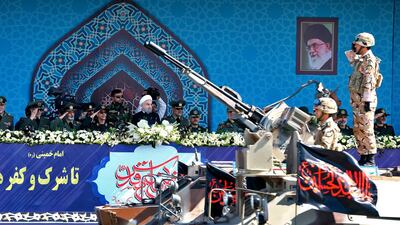Governments around Europe called for an extension of the 2015 nuclear agreement with Iran on Tuesday in the wake of an Israeli intelligence operation that revealed Tehran has retained atomic weapons know how.
Britain and France led a coordinated series of statements that welcomed Benjamin Netanyahu's revelations but threw over his calls to scrap the deal that halt much of the Iranian nuclear programme.
“The Iran nuclear deal is not based on trust about Iran’s intentions; rather it is based on tough verification, including measures that allow inspectors from the International Atomic Energy Agency unprecedented access to Iran’s nuclear programme," said Boris Johnson, the British foreign secretary. “The fact that Iran conducted sensitive research in secret until 2003 shows why we need the intrusive inspections allowed by the Iran nuclear deal today. The verification provisions in the Iran nuclear deal would make it harder for Iran to restart any such research. That is another good reason for keeping the deal while building on it in order to take account of the legitimate concerns of the US and our other allies.”
President Donald Trump has said that he persuaded visiting French leader Emmanuel Macron of the merits of scrapping the deal at a White House meeting last week. Mr Trump has set a deadline of May 12 to pull out of the pact.
The French president has promoted a wider overhaul of constraints on Iran based on four pillars, adding Iran’s long-term nuclear work, its regional military activity, and its ballistic missile programme to the 2015 deal.
Foreign ministry spokeswoman Agnes von der Muhll said Paris would evaluate how the trove of nuclear files spirited from Tehran would strength its calls for wider action," he said.
"The new information presented by Israel could also confirm the need for longer-term assurances on the Iranian programme, as the president has proposed."
On Monday evening, US secretary of State Mike Pompeo said he believed Israeli Prime Minister Benjamin Netanyahu when he said that Tehran had been hiding secret nuclear weapons files.
_______________
Read more:
Netanyahu’s Iran presentation plays into Trump’s hands to exit the nuclear deal
Israel claims to have proof of 'secret' Iran nuclear programme
Qatar ransom cash boosts Iran-backed 'terrorist' group ahead of Iraq elections
_______________
US President Donald Trump has made repeated threats to tear up what he has termed the “worst deal ever”, which lifted sanctions on Iran in exchange for Tehran giving up its nuclear ambitions.
But Britain’s Middle East Minister Alistair Burt said the deal, which is also called the Joint Comprehensive Plan of Action, was promoting peace.
“The UK has been very clear that JCPOA is still in the interests of the region,” Mr Burt said. “If you take away JCPOA then what do you leave? And that’s what we’re most concerned about.”
He described the situation in the region as "extremely tense” and said the UK would continue to back the deal, which was helping to “de-escalate tension”.
Federica Mogherini, the EU's foreign policy spokeswoman, said she had not seen anything that would suggest Iran had violated the International Atomic Energy Agency (IAEA).
"What I have seen from the first reports is that Prime Minister Netanyahu has not put into question Iran's compliance with the JCPOA (Joint Comprehensive Plan of Action) commitments, meaning post-2015 nuclear commitments," she said. "I have not seen from Prime Minister Netanyahu arguments for the moment on non-compliance, meaning violation by Iran of its nuclear commitments under the deal."
Mr Trump has praised Mr Netanyahu’s intervention over the secret nuclear files, saying this proved he had been “100 per cent right” about the agreement.
Mr Trump made a pledge to overturn the deal during his election campaign but has yet to say whether he will pull the US out of the accord when the May 12 deadline for a decision comes.

